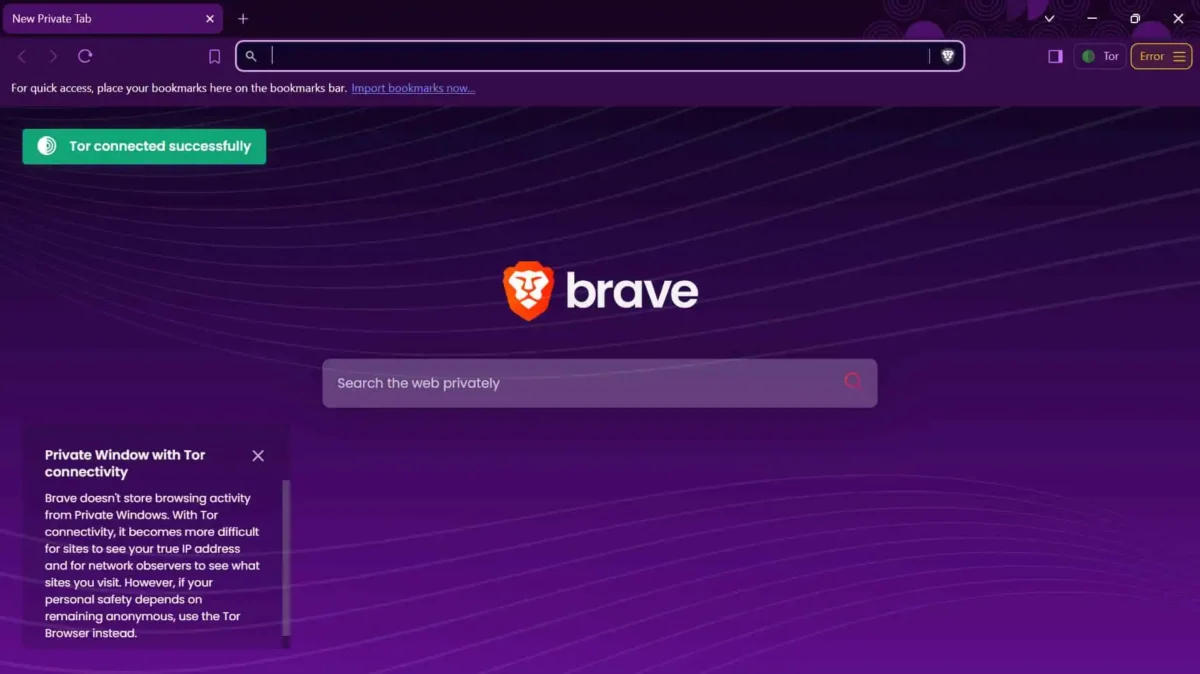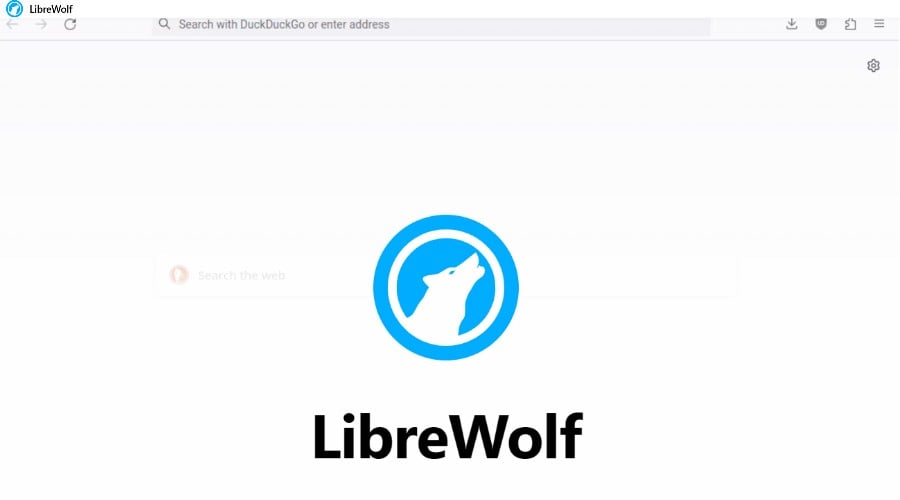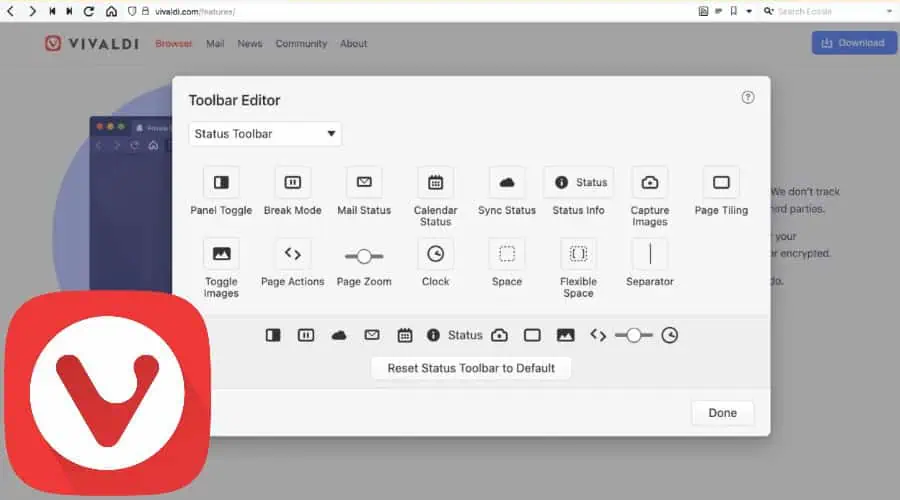Waterfox Alternative: 8 Private and Feature-Rich Browsers

The Waterfox browser is known for its unique take on privacy and is one of the few Firefox forks that has a good extension library.
But it’s not for everyone. If you’re searching for a Waterfox alternative, I’ve got your back!
I got hands-on with over 20 browsers and picked out the top 8 that share similarities but offer other useful features Waterfox lacks. Here’s everything you need to know.
Best 8 Waterfox Alternative Browsers
1. Opera – Best Waterfox Alternative

Coming out on top is Opera, which has a more robust ad blocker and an overall better privacy and security approach.
Not only does it block trackers, offer private search, and doesn’t collect data, but it also has a full ad blocker. This removes annoying display ads, not just popups or dangerous sites.
Unlike Waterfox’s Oblivious DNS feature that hides your activity from your ISP, Opera has an unlimited free VPN that does this through encryption.
It changes your IP address to a location of your choosing to bypass geo-restrictions. Moreover, its encryption ensures your ISP, network admin, and other snoopers cannot access the content of your browsing sessions.
Opera is also based on Chromium, which provides more extensions than Waterfox to expand the functionality and features of the browser.
Opera stands out with one of the most advanced built-in AI assistants. Unlike other browser AI features, Aria AI can even generate images from prompts, not just text content. Moreover, it helps digest the content of web pages and explore other sources about the topic at hand.
I really like that it allows you to use social media and messaging apps within the browser sidebar itself.
To top things off, Opera consumes less RAM than many popular browsers like Edge and Chrome.
Pros:
- Advanced ad blocker and free VPN
- Cutting-edge Aria AI assistant
- Social media and messaging apps built-in
Cons:
- Lacks Firefox extensions
- Not open source
2. Brave – Most Private Waterfox Alternative

If Waterfox is the most secure Firefox fork, then Brave is the most secure Chromium-based browser, making it an excellent alternative.
Brave search keeps your search history private and away from Google. Meanwhile, its full ad blocker ensures not even display advertising disrupts your browsing experience.
While it lacks Oblivious DNS, it follows Opera’s lead with a built-in VPN. The drawback is you’ll have to pay a subscription after using the 7-day free trial.
On the other hand, its Tor browsing mode is free and provides similar encryption to a VPN while allowing you to access the dark web without switching browsers.
Brave also boasts a powerful AI assistant called Leo. This lets you explore content by highlighting page text, asking the chatbot questions to get info, and composing text by asking what you want.
Like Waterfox, the browser consumes less RAM than most popular browsers. However, it has the edge when it comes to extensions thanks to the Chromium library.
Brave’s standout native feature is Brave Talk. This meetings and conferencing app is encrypted and doesn’t limit the time or the number of participants in the meeting.
Pos:
- Full ad blocker
- Tor browsing mode
- AI Assistant
- Chromium extensions
Cons:
- Lacks Oblivious DNS
- Full VPN access isn’t free
3. LibreWolf – Best Firefox Fork Browser

As a privacy-focused Firefox fork, LibreFox is the closest Waterfox alternative when it comes to features.
The fast and clean browser skips Google and encourages DuckDuckGo, Searx, and Qwant as its default search engines. Moreover, it blocks tracking cookies, adware, and popups.
It has the advantage of a native version of uBock Origin, which blocks ads, including annoying display ads, so pages load faster and you’re never at risk. However, unlike Opera, it lacks a VPN. It also lacks Waterfox’s Oblivious DNS.
I like that it uses container tabs, which automatically group tabs for work, shopping, and personal browsing. Furthermore, its traditional interface mirrors Waterfox, though you can still make basic customizations.
Like Waterfox, it supports legacy extensions that aren’t compatible with the newer versions of Firefox. It also boasts its own unique add-on library, many of which enhance privacy and security even further.
LibreFox downloads regular updates based on the latest version of Firefox, ensuring that it stays up to date with security and performance improvements.
Nonetheless, the impact on system resources is minimal compared to Firefox itself, due to its ad-blocking and scaled-back interface.
Pos:
- Full ad-blocker from uBlock Origin
- Intuitive tab grouping
- Supports legacy extensions
Cons:
- Lacks a VPN and Oblivious DNS
- No AI assistant
4. Firefox – Widest Selection of Firefox Extensions

If a Firefox experience is what you prefer, then the latest Firefox release cannot be ignored. Unlike Waterfox, you get free reign over the entire Firefox extension library, and the browser itself is highly customizable.
Like Waterfox, you can customize toolbars, change themes, and make deeper changes with CSS coding and the about:config settings.
The Firefox Pocket feature is particularly appealing. It lets you save page content and videos to view offline, across all your devices.
To a lesser extent, Firefox also has good privacy features. It doesn’t collect personal data, blocks trackers, has a private browsing mode, and supports per-site privacy settings. However, it lacks a full ad blocker, VPN, and Waterfox’s Oblivious DNS feature.
The main drawback is Firefox is one of the more resource-intensive browsers and isn’t as fast and clean as Waterfox.
Pros:
- Full Firefox extension library
- Very customizable
- Native features like Firefox Pocket
Cons:
- Consumes a lot of RAM
- Not as private as Waterfox
5. Epic – Best for Crypto Miners

The Epic Privacy Browser is another alternative with a great set of privacy features, but this time on Chromium. Unlike Waterfox, you get a free VPN that encrypts your internet activity and changes your visible IP address.
Moreover, the private browsing mode, ad and tracker blocker, and default browsing history deletion, maintain anonymity online.
There’s even a one-click encrypted proxy, which is a quicker way to hide your IP address.
If you are into crypto mining, you’ll benefit from protection against zombie mining attacks, without interfering with your legitimate mining activities.
Unlike Waterfox, the Chromium extension library has much more to offer, though the browser interface itself is not as customizable as Waterfox.
Pros:
- Free VPN and proxy features
- Blocks ads and even crypto-mining malware
- Chromium extension library
Cons:
- Not as customizable as Waterfox
- Lacks common Chromium features like AI
6. Vivaldi – Most Customizable Waterfox Alternative

Fully customizing Waterfox requires a bit more of a learning curve than Vivaldi, which lets you tweak every aspect of the interface with ease.
This Chromium browser has a simple drag-and-drop process for many tweaks, including the toolbars, menus, and other aspects. It also offers theme customization, and you can even set it to change themes based on a set schedule.
Change the icons, make keyboard shortcuts, and customize mouse gestures to streamline your workflow. Even tabs can be displayed exactly to your liking. My favorite is the tree structure, but you can stack and tile tabs too.
Tech-savvy users can dig deeper and play with the code to make the browser truly your own.
As a Chromium browser, there’s an extensive library of add-ons to further expand its functionality.
It’s no slouch when it comes to privacy either, offering a full ad blocker, free VPN, and private browsing.
Vivaldi is also one of the least impactful on system resources, so give it a try.
Pos:
- Free VPN and ad blocker
- Most customizable browser
- Low RAM usage
Cons:
- Not open-source like Waterfox
- Not for those who prefer Firefox
7. Avast Secure Browser – Best for Safe Shopping and Banking

Avast Secure deserves an honorable mention for those who value privacy and security, but to get the full benefit you should already be an Avast user.
It offers anti-tracking, an advanced ad blocker, and access to the Avast SecureLine VPN, though it limits you to 500 MB of data a month unless you purchase the premium version.
If you want to move beyond the Firefox legacy extensions of Waterfox, Avast Secure is Chromium and gives access to many of the extensions Chrome provides.
I like its simple interface and minimal impact on RAM. However, its best feature is safe shopping and online banking. This blocks dangerous sites and phishing attempts, while auto-filling login and payment information securely, which prevents keylogging and credential theft.
The Banking Mode ring-fences online banking session from your other tabs, making it more secure than regular HTTPS.
Pros:
- Unique shopping and banking protection
- Chromium extensions
- Minimalist interface
Cons:
- Works better for paying Avast users
- No AI or other extras
8. Pale Moon – Support for Legacy Firefox Extensions

If you prefer a Firefox fork browser, then Pale Moon certainly makes the list. It too supports legacy Firefox add-ons and is a traditional lightweight browser without unnecessary sidebars and features.
Because it’s open source, it is very customizable, allowing you to modify the code to change its look and feel, though novices might find this a bit overwhelming.
It’s also quite good for privacy, with no data collection, per-site permissions, and an encrypted password manager.
The uBlock Origin ad blocker is native to the browser, so say goodbye to popups and intrusive display ads.
While Pale Moon is optimized for modern processors and supports the latest web standards, it also runs in single-process mode, which can improve stability, which is especially beneficial for older PCs.
Pros:
- Native ad blocker
- Minimal impact on system resources
- Open-source and customizable
Cons:
- Lacks a large extension library
- No AI assistant, VPN, or extra security features
How to Choose the best Waterfox Alternative
To find the best Waterfox alternative, I focused on its core features, such as privacy and the Firefox backend. However, other browsers I considered are based on Chromium and have other useful features that make them a good alternative. When making your choice, here’s what to look for:
- Privacy and Security – Waterfox has several unique features that make it a great private browser. When looking for alternatives, Opera, Brave, and LibreFox stood out with VPNs and other privacy features, offering a similar, if not better experience when you want to be safe and anonymous online.
- User Interface – Waterfox has a clean and traditional interface similar to the pre-Quantum Firefox update, so I focused on traditional or minimalist browsers that don’t have too much going on onscreen. However, Firefox itself couldn’t be ignored thanks to its modern extensions and features that are lacking from many of the forked alternatives.
- System Performance – As a relatively lightweight browser that has a midlevel impact on system resources, I looked at Waterfox alternatives that conserve RAM, such as Pale Moon, LibreFox, Brave, and Vivaldi. Check the comparison table below for a quick overview. However, others like Firefox itself and Opera may have a larger impact, but this is because they have more features that are worth considering.
- Customization – With Waterfox’s ability to add and remove buttons, rearrange toolbars, and customize themes, it’s important to choose a browser that gives you the freedom to personalize it in the way you desire. Firefox and all its forks are great at this, but Chromium-based Vivaldi is also extremely customizable.
- Extensions – The ability to add new features to your browser via extensions and add-ons is an important aspect of any browser. Waterfox has the distinction of supporting legacy Firefox extensions like Pale Moon but also has its own unique add-on library. Chromium browsers like Opera, Brave, and Vivaldi make excellent alternatives as the extension library is bigger than Firefox’s
- Artificial Intelligence – Waterfox and other Firefox-based browsers don’t yet support AI assistants, which is why Opera is such a powerful alternative. As AI becomes commonplace, you may want to make the jump to a browser that has implemented it well.
Summary
Now you’ve got an in-depth look at all the best Waterfox replacement browsers.
To compare how they run on Windows, I loaded the same 5 tabs and calculated the average range of RAM consumption.
| Browser | Ram Consumption | Extensions | Customization | AI Assistant | Privacy Rating |
| Opera | 1,300-1,320 MB | Chromium | Limited | Yes (Inc. Text-to-Image) | 4/5 |
| Brave | 560-580 MB | Chromium | Limited | Yes | 5/5 |
| LibreWolf | 820-850 MB | Legacy Firefox + LibreWolf Add-ons | Limited | No | 4/5 |
| Firefox | 1,700-1,720 MB | Modern Firefox | Interface and developer settings | No | 3/5 |
| Epic | 980-1,000 MB | Chromium | Limited | No | 4/5 |
| Vivaldi | 595-615 MB | Chromium | Full interface tweaking | No | 4/5 |
| Avast Secure | 780-800 MB | Limited Chromium | Limited | No | 4/5 |
| Pale Moon | 850-890 MB | Limited Firefox | Open-Source | No | 3.5/5 |
Despite switching from Firefox to Chromium, Opera is the best all-around Waterfox alternative. It shares the same goal of privacy but adds a ton of modern features, such as a powerful AI tool and free VPN.
Brave is a close second, but the premium nature of its VPN holds it back.
LibreWolf stays loyal as a Firefox fork with a focus on privacy, while Vivaldi really opens a new world of customization.
Read our disclosure page to find out how can you help MSPoweruser sustain the editorial team Read more




User forum
0 messages